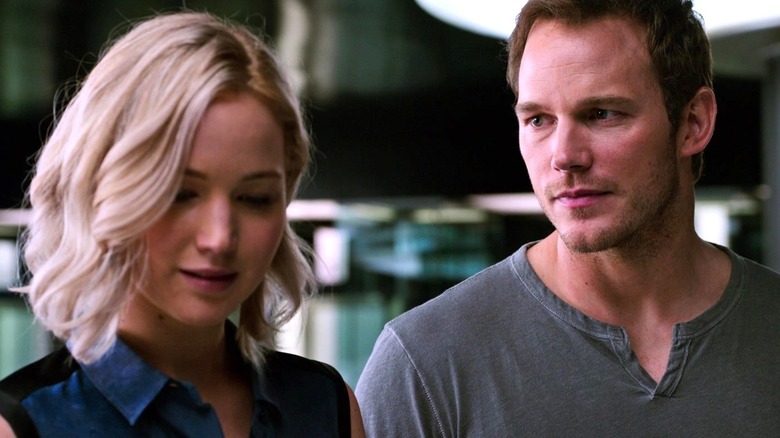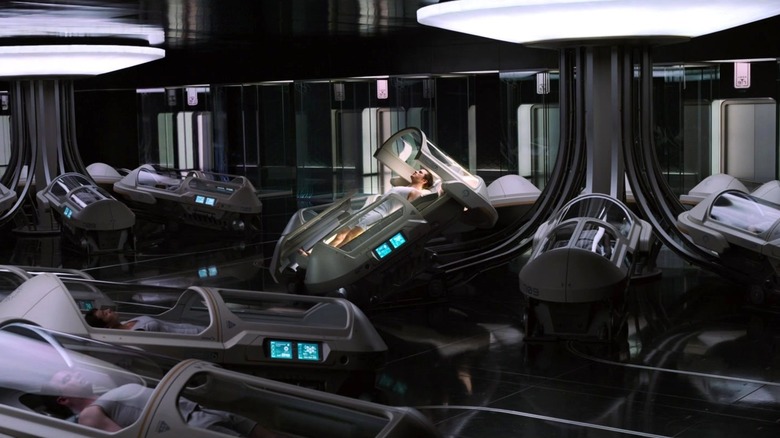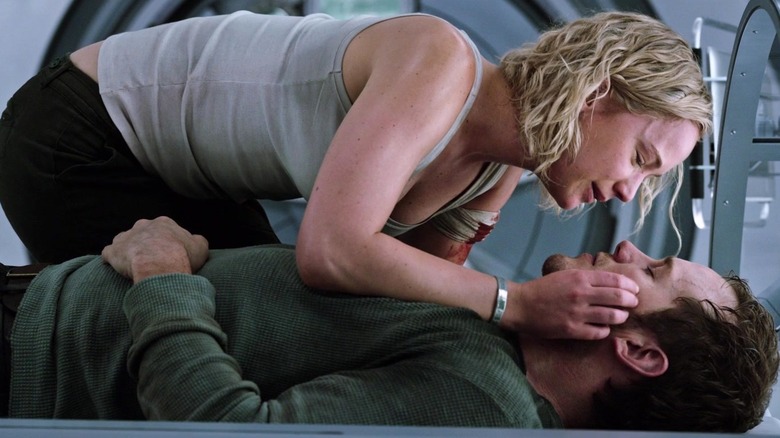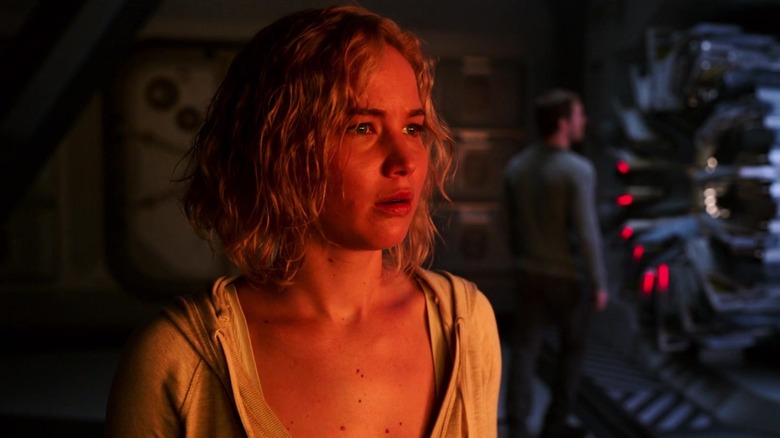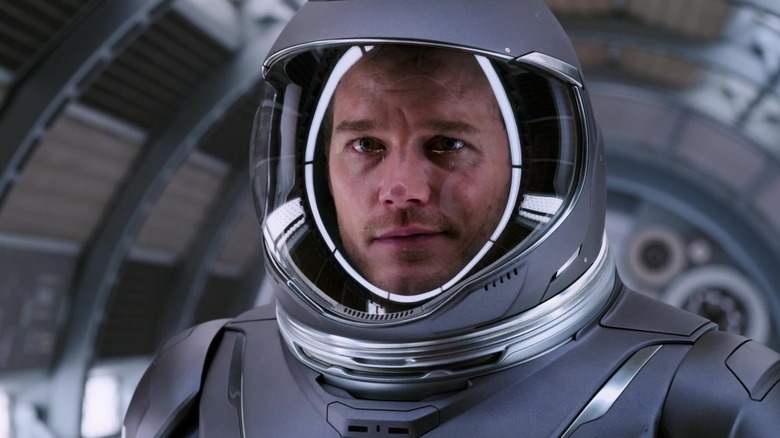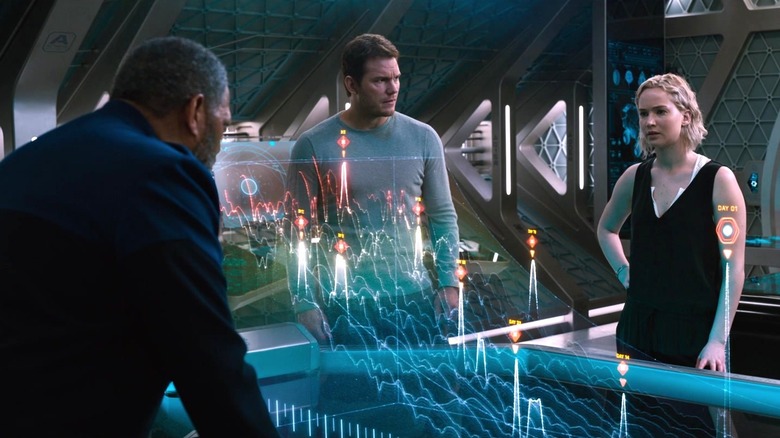Let's Discuss The 'Passengers' Ending And How The Script Was Different From The Movie
We may receive a commission on purchases made from links.
In 2007, "Passengers" ranked highly on the Black List, a listing of the best unproduced screenplays in Hollywood. Penned by Jon Spaihts (who'd go on to co-write both of Denis Villeneuve's "Dune" movies), the project struggled to hit the big screen for years, at one point lining up Keanu Reeves and Emily Blunt to star in a $35 million version of the story. Sony Pictures eventually won the project at auction and set director Morten Tyldum to helm a $110 million version of the project with Chris Pratt and Jennifer Lawrence.
The result was an incredibly controversial sci-fi film that both bombed at the domestic box office and was torn apart by critics. The premise for the film is that two passengers — Pratt and Lawrence — are awakened 90 years early on a spacecraft transporting thousands of people to a distant colony planet. But the marketing of the film presented a different story than what audiences eventually saw in theaters. Many were surprised to find that Sony had cleverly hidden the ethical quandary at the core of this movie — the malfunction on the spaceliner didn't wake up both lead characters. It only woke up Pratt's Jim Preston, who eventually succumbs to loneliness and awakens Lawrence's Aurora Lane against her will.
Needless to say, "Passengers" and its ending didn't sit well with everyone. However, it's fascinating to look at the film's ending and how it compares to what's on the page. If you want to learn more about the long and troubled journey of "Passengers," then read on — but beware of spoilers.
Passengers has a problematic premise
Chris Pratt's character Jim Preston was woken up 90 years too early. With no way to correct this error, he finds himself alone on the ship with nothing to do. Facing the prospect of dying alone, Jim finds himself considering suicide. That is until he develops a stalker-like crush on fellow passenger named Aurora Lane (Jennifer Lawrence) and decides to do the morally bankrupt thing of waking her up and essentially dooming her to share his same fate, but together. He, of course, does not tell her that he was responsible for her pod's "malfunction," and the two hit it off, but it's only a matter of time before she learns for herself.
The decision at the front of this story is icky at best, and screenwriter Jon Spaihts addressed the criticism of his hero's highly unethical actions in an interview with io9:
It's not as if it's an accidental oversight of the film, where we, through some cultural blindness, have failed to see the appalling nature of our hero's actions. It is the subject of the film. And I think that making a movie that leaves people room to argue about what they would have done, what they could have forgiven, what they can understand or fail to understand, I think that's great. I think that's good storytelling. What I don't believe the movie does is endorse or exonerate anyone. The movie looks, evenhandedly, at the dilemma everybody was in. I think putting good people in impossible circumstances makes for fascinating storytelling.
I think the terrible icky ethical decision that Jim makes early in this film and the consequences of his actions is the most interesting piece of this story. Not only that, but it's a scenario that is uniquely sci-fi and likely couldn't be explored in any other form.
How does Passengers end?
In the theatrical version of the film, Jim heroically sacrifices himself to open the airlock on the outside of the ship to stop the spaceliner from being destroyed. But in the process, Jim has been pushed out into space, and his tether to the ship breaks. Aurora rushes to save him but isn't able to reach him in time. She can, however, reach his broken tether and is able to pull his body back to the ship. She discovers she is too late — with a fractured space suit, Jim has died.
Aurora is not willing to accept this outcome and drags Jim to a medical scanner in the crew quarters to resuscitate him. This doesn't work, and then it does. Jim is saved at the last possible second. She is so happy he is alive and is no longer mad at him. Later, Jim discovers that the medical scanner can put one person back to sleep for the rest of the ship's journey, but Aurora decides she would rather remain awake aboard the ship with Jim living the rest of their lives together.
Now let's find out what the "Passengers" ending was like in the original script.
How does Passengers end in the script?
With 10 years of development, you'd be surprised how much of Jon Spaihts' original "Passengers" script made it in the final cut. If I were to estimate, I'd say it's 85-90% the same story and characters that are seen on the screen. So how was the "Passenger" ending in the original script different from the one that made it to theaters?
There aren't a lot of big differences until the ending. Gus, the character played by Laurence Fishburne in the film, has a different ending in the final film. Instead of passing away, after giving Jim and Aurora the information they need to hopefully fix the ship, Gus decides to take his own life. Too ill to help, Gus would rather go out on his own two feet, and he lets himself fall into the vacuum of space through the airlock. Not a huge change.
The real turn comes when Jim and Aurora are able to get the ship to reboot, and the hibernation pods begin to unexpectedly eject from the spaceliner as the ship believes it's in port and in dry dock procedure. Jim runs down to the hibernation bay to try to stop it, working on one of the containment units as the pods in the distance eject, fast approaching him. He tries, but is too late. He runs to the crew hibernation pod facility and is able to turn on the opening procedure on the captain's pod before it's ejected. The Captain opens his eyes, just before the pod ejects out into space. Imagine the horror of this situation.
The couple look out the window at the observation desk at the five thousand pods ejected into space. Imagine the hopelessness. Aurora comments that if it weren't for Jim waking her up, she would be out in space right now with the other passengers. This line reasons that Jim's horrible judgment earlier in the story was not-so-horrible in retrospect. But Jim didn't know this would be the end result when he woke her up; it was still a morally and ethically horrible decision. But in the way it is framed in the original script, we are to think that it was not for the best?
Which version of Passengers is better?
In the script, Jim and Aurora ultimately decide they do love one another, and Jim brings Aurora for a walk on the outside of the ship (something that happens earlier in the final film). That's the ending for them, but not the ending of the movie. Like the theatrical version of the film, the story cuts to 80 years later as the spaceship approaches the new colony. But in the script, the ship is actually landing on Homestead II, and we see the scene from the perspective of the colonists gathering to watch the new citizens arrive. The doors open and ... children of all ages and adults in smaller numbers exit.
You might be wondering how there are passengers aboard a ship that had ejected all of it's hibernation pods. Early in the screenplay, Aurora finds the gene bank about the spaceliner, containing 5,000 sperm and egg samples on ice. She comments, "I should be glad they do that. By the time we get to Homestead II, that little capsule in the freezer is going to be all that's left of me." While it's not stated in the original screenplay (which confused some readers), it's implied that they repopulated the ship with the sperm and egg samples of the dead passengers.
We then, of course, see a similar scene to that in the final movie, with a century's habitation overgrown through the ship. We also get a glimpse of Arthur slicing vegetables at the bar, and a high wall in the concourse listing all the births, deaths, marriages, catastrophes and achievements of the last century of space travel, alongside a table with a collection of artifacts from the story including Gus's worn shipcard and a book Aurora has written about the experience. With all that in mind, we have to ask — which ending is better? The original script or what ended up in the film?
The original ending from the script is a cop out, as if Jon Spaihts got notes that the film couldn't end with all of the ship's inhabitants dying in the blackness of space. The hibernation pod ejection sequence is exercised from the final film but at the expense of Aurora's realization that she would have died if Jim hadn't woken her up early. The original script ending was confusing and felt shoehorned in. The theatrical ending of Jim presenting Aurora with the choice of the ship's single hibernation pod is an interesting way to address the ethical problem at the nucleus of this relationship, but it is also thoroughly unsatisfying.
This is how Passengers should have ended
I believe they should have found a way to explore this troubled relationship and this really f***ed up situation to its full conclusion instead of taking this story to a disastrous action-filled climax. The third act of this film is a complete mess and sidesteps the real problem introduced in this story.
Indiewire critic David Ehrlich has suggested a better "Passengers" ending which "would have been better served if Pratt died in Act Three and Lawrence then realized herself that she needs to wake someone up too to avoid a lifetime alone." I think that the story could have benefited from this more tragic conclusion that challenges our supporting character with the same ethical dilemma. Perhaps it would have been better to end the film in classic Twilight Zone-like fashion without revealing Aurora's ultimate decision, presenting the question on the audience in a more direct way.
Another option would have been to have the story evolve into the horror genre and present a situation where the protagonist has developed into the antagonist. It's now a situation where the stalker and the stalkee have to live together alone amongst a huge aboding starship. Jim is unable to accept that Aurora is uninterested in him, as she's creeped out by his horrible actions and unwilling to ever accept his apology.
We thought Jim was a good guy who makes a horrible icky decision while presented with a dire situation, but maybe we come to realize that he wasn't such a good of a guy after all? Jim gets more aggressive in his approaches, and it becomes really scary. Aurora realizes that if she doesn't stop Jim, it won't end well for her.
